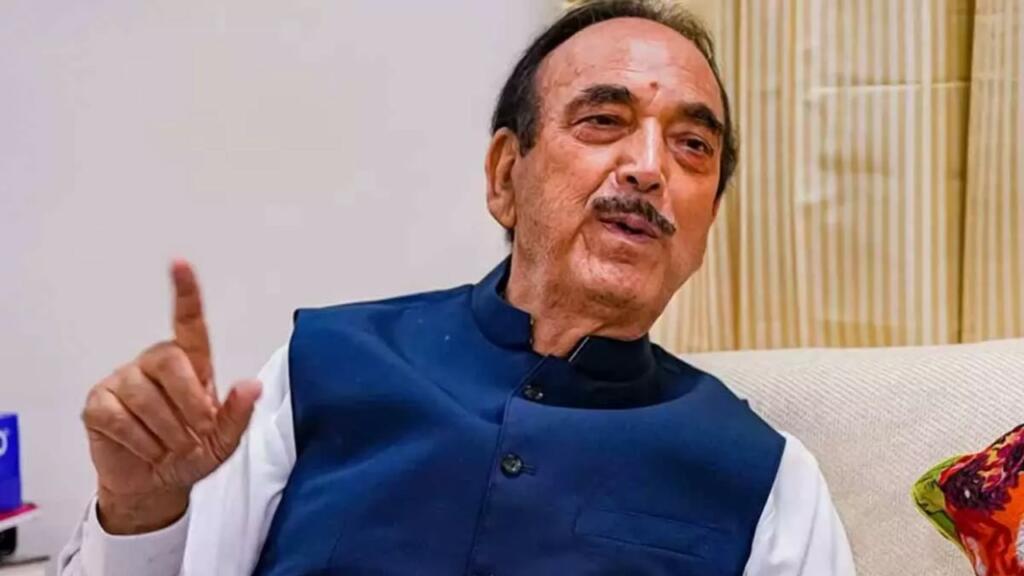Ghulam Nabi Azad, the former Chief Minister of Jammu & Kashmir, is once again gracing the headlines, this time for a profound historical perspective that has ignited discussions across the nation. In a recent address at Chiralla town in Doda district, Azad delved into the annals of time, reshaping our understanding of the region’s heritage.
In his articulate discourse, Ghulam Nabi Azad brought to light a perspective that challenges conventional narratives and questions the distinction between “insider” and “outsider.” Ghulam Nabi Azad recounted an incident from his parliamentary experience, where a BJP member was emphasizing the dichotomy between those who migrated and those who hailed from the land. Azad’s response was a nuanced exploration of history and faith.
“I have said this in parliament also. That might not have reached you,” Azad began. He emphasized, “In a discussion, a BJP member was telling me about who came from outside and who belonged to this land. I said, there is not an issue of insider and outsider. Every one of us is from here only.” This assertion formed the cornerstone of his narrative – that the concept of belonging transcends superficial categorizations.
Ghulam Nabi Azad proceeded to unveil a historical timeline that revealed the real heritage of Kashmir. He explained, “Islam emerged around 1,500 years ago, while Hinduism is deeply ancient. Some Muslims may have arrived from external origins and served in the Mughal army. Then, people converted from Hinduism to Islam within India.” This historical transformation, he contended, reflects the interconnectedness of faith and culture over the ages.
Also read: I.N.D.I.A. officially ends in Delhi
The former CM Ghulam Nabi Azad then turned his gaze towards Kashmir, a region steeped in mystique and complexity. He posed a thought-provoking question, “Was there any Muslim in Kashmir 600 years ago?” He then dismantled historical layers to reveal a profound reality: “All of them were Kashmiri Pandits before they were converted to Islam.” This assertion, grounded in historical context, challenges our perception of identity and heritage.
Azad’s perspective resonates beyond political boundaries. It mirrors the ongoing conversation about heritage and identity across the nation, particularly in the context of Kashmir. Only a few days ago, another voice from Kashmir, notorious activist Shehla Rashid, took to social media to reluctantly acknowledge positive changes in the Kashmir Valley. Azad’s narrative adds another layer to this evolving discourse, invoking a spirit of reflection and reconciliation.
The significance of Azad’s statement goes beyond the immediate context. It holds the potential to reshape the narrative surrounding Kashmir’s history and the identity of its people. By tracing the lineage of its inhabitants, Azad not only reminds us of the interconnectedness of faiths but also offers a platform for acknowledging shared roots.
The impact of Azad’s address reaches far and wide. His articulation of history and heritage provides a potential roadmap for a more harmonious and united Kashmir. By acknowledging the origins of different faiths within the region, Azad challenges divisive narratives and paves the way for inclusivity and understanding.
As the nation assimilates Ghulam Nabi Azad’s thought-provoking remark, it becomes evident that the road to a more prosperous and thriving Kashmir is brighter than ever. His words serve as a catalyst for conversations that transcend political rhetoric and delve into the essence of our collective past. In this new light, the heritage of Kashmir is intricately woven into a fabric that celebrates diversity, acknowledges transformation, and paves the way for a shared future.
Support TFI:
Support us to strengthen the ‘Right’ ideology of cultural nationalism by purchasing the best quality garments from TFI-STORE.COM
